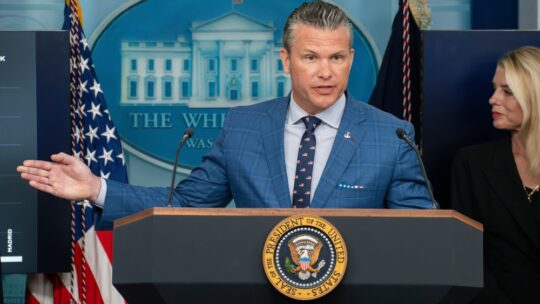
When the world’s most powerful defense institution declares that “the press no longer roams free,” it’s a revealing example of how even someone steeped in media can misunderstand both a mandate and the medium.
In attempting to manage perception through control, the current U.S. Secretary of Defense and former Fox News host, Pete Hegseth, exposes a truth long known to communicators: those who fear scrutiny rarely grasp its value. A free press is not a threat to the Pentagon’s mission; it is the mechanism through which the public grants it legitimacy.
The Pentagon’s new press policy, which essentially criminalizes “unapproved interactions” between Pentagon employees and reporters, seeks to deter even routine exchanges of information.
Pentagon Policy Brings Partisan Media Together
Major outlets including The New York Times, The Washington Post, Associated Press and others, including conservative platforms like Newsmax and Fox News, have publicly refused to sign the policy. The bipartisan nature of the media’s rejection of this move should not be overlooked: when ideological rivals stand shoulder to shoulder against a policy, it's a clear signal that you’re in the wrong.
From a crisis communications standpoint, the Pentagon’s framing of the policy as a matter of “discipline and security” is deeply flawed. When Hegseth wrote on X, “Press no longer roams free,” the statement read as a declaration of institutional overreach. In a media environment where perception is inseparable from reality, tone becomes policy. The optics of control (emojis waving goodbye to dissenting outlets, mocking social posts) undermine institutional credibility, invite cynicism and signal insecurity where authority should project confidence.
It’s a textbook example of what Edward Bernays, a pioneer of PR, foresaw a century ago in his book, "Propaganda": “The conscious and intelligent manipulation of the organized habits and opinions of the masses is an important element in democratic society.”
Bernays wrote those words to describe how persuasion could stabilize democracy through managed communication. But when that “intelligent manipulation” becomes coercive, it no longer serves democracy; it subverts it.
Short and Long-Term Effects of the Policy
The greatest irony is that this communications strategy contradicts its own purpose. Efforts to suppress coverage invariably amplify it. By restricting hallway access and escorting journalists like trespassers in a building built to serve civilian oversight, the Pentagon transformed a procedural issue into a global story about transparency, one that even their most loyal allies in the press could not ignore.
From a practitioner’s lens, this is a classic misalignment between short-term narrative control and long-term reputational capital. The intent may be to centralize messaging and minimize leaks, both reasonable objectives in any organization managing classified operations. Yet when the cost is alienating every major news outlet and eroding the presumption of transparency, the communications control gain becomes too great a cost.
In crisis management, perception of fairness and openness matters more than the message itself. A policy perceived as punitive or exclusionary creates a self-fulfilling crisis of legitimacy. Reporters denied access will find other channels, whistleblowers, leaks, unofficial sources, and the narrative will continue, now shaped by those excluded from the room.
Lessons from the Pentagon Press Policy
For PR professionals—whether advising governments, corporations, or NGOs—the Pentagon episode underscores several key lessons:
- Never Confuse Message Control with Trust. Restricting access may quiet dissent temporarily, but it breeds suspicion permanently.
- Anticipate the Optics of Every Policy. A rule that looks bureaucratically rational inside an organization can appear draconian outside it.
- Transparency Is a Strategic Asset. Governments and corporations alike should recognize that openness sustains long-term credibility. Silence, by contrast, feeds speculation.
For journalists, the episode is an inflection point. The refusal of nearly every major outlet to sign the policy represents a rare act of industry solidarity. It reinforces the principle that access is not a privilege bestowed by power but a function of democracy itself.
For the general public, this standoff carries implications beyond the walls of the Pentagon. If transparency can be curtailed in the nation’s most scrutinized building, it can be curtailed anywhere. What the Pentagon might be testing, deliberately or not, is how far institutional messaging can replace independent reporting. NPR’s Tom Bowman accurately noted, “carefully orchestrated videos” are poor substitutes for free inquiry. The shift from journalism to marketing may seem efficient, but it signals a cultural regression from a government accountable to its citizens to one narrating its own mythology.
The lesson for communicators is clear: when truth competes with narrative, the only sustainable advantage is transparency. Control may offer temporary comfort, but credibility sustains power.
Julio E. Ligorria is Senior Director of Public Relations and Government Affairs at Roar Media. Over the last decade, he has advised heads of state, ministers, diplomats, multilateral organizations, and multinational corporations on public affairs, crisis communications and media strategy.
